| |
Observing
tips: Look
west 30 to 60 minutes after sunset when
the Sun has dipped 6o to 16o below the horizon.
If you see luminous blue-white tendrils spreading across the sky,
you've probably spotted a noctilucent
cloud. Although
noctilucent clouds appear most often at high latitudes such as Scandinavia
and Canada, they have been sighted
in recent years as far south as Colorado, Utah and Virginia. NLCs
are seasonal, appearing most often in late spring and summer. In
the northern hemisphere, the best time to look would be between
mid-May and the end of August. See also 2003,
2004, 2005
and 2006. |
 |
| |
| |
Photographer,
Location |
Images |
Comments |
|

|
Brian Whittaker,
Birmingham, England (52.5N)
Jun. 12, 2007 |
#1,
#2, #3,
more |
The best display
I've seen of Noctilucent Clouds from my house. Abnormally
high in the sky, reaching well above the British horizon
haze.
Photo
details: Canon
EOS XTi. |
|
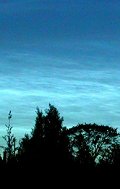
|
Vladimir Ladinsky,
Moscow, Russia
Jun. 12, 2007 |
#1,
#2, #3,
more |
At midnight
I took my Nikon 4500 and went outside to shot NLC. It was
very low above horizon but bright and slightly twisted.
|
|
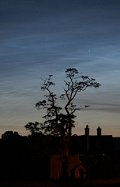
|
Richard Fleet,
Pewsey, Wiltshire, England
Jun. 12, 2007 |
#1,
#2, more |
This is a good start to the season with a nice evening display. The sun was 11 degrees below the horizon and the bluish tint of the noctilucent cloud was quite distinct compared to the dull brown of lower level cirrus and contrails.
|
|
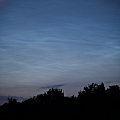
|
Kiran Chakravarti,
Bishop's Stortford, England
Jun. 12, 2007 |
#1,
more |
It was the first
time I had ever seen a display of noctilucent clouds. They
were amazing; the cloud structure was very complex and changed
with time. They were easy to make out as they were still
illuminated by the Sun whereas other clouds were not.
Photo
details: Olympus
E-500 DSLR, 8 secs, f/3.5, 40mm lens, ISO 100. |
|

|
Dr
Francisco Diego,
flying from Los Angeles to London over Hudson Bay..
Jun. 8, 2007 |
#1,
#2,
#3 |
Dr.
Francisco Diego was flying from Los Angeles to London on
June 9th when he looked out the window and witnessed this
colorful display over Hudson Bay.
On
the left is the aurora borealis, caused by charged particles
from the sun hitting Earth's upper atmosphere. The color
comes from oxygen molecules glowing green on impact. Auroras
are located 80 km to 500 km above the ground.
On
the right is a bank of electric-blue noctilucent
clouds (NLCs), caused by ... what? No one knows precisely
what causes these clouds; a NASA mission named AIM
is in orbit to investigate. Noctilucent clouds are located
about 80 km above the ground.
"The
aurora was very dynamic. I took three pictures a few seconds
apart by pressing a small digital camera against the plane's
window and holding it there by hand," says Diego. |
|
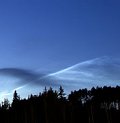
|
Yuichi Takasaka,
New Aiyansh, British Columbia, Canada
Jun. 8, 2007 |
#1,
#2, #3,
more |
"I
went outside on June 8th to look for auroras, but I found
these noctilucent clouds instead," reports Yuichi Takasaka
of New Aiyansh, British Columbia. Note the
difference in Takasaka's photo between normal clouds
and noctilucent clouds: Normal clouds are dark while NLCs
glow brightly against the twilight sky. This is because
normal clouds hang low in the troposphere, about 10 km high;
after sunset they are no longer lit by the sun. NLCs, on
the other hand, float at the very top of Earth's atmosphere,
about 80 km high. At that altitude, they remain sunlit long
after normal clouds go dark.
Photo
details: Pentax
K10D, SMC FA 24mm lens & DA 40mm lens |
|
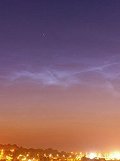
|
Paul
Evans,
Larne, Northern ireland
Jun. 7, 2007 |
#1,
#2, more |
This
is a 3 shot panorama of the NLC display - this was approx
25 deg high by over 100 deg wide - the best display so far
in the 2007 season.
Photo
details: Minolta
Dynax 5D, 50mm lens, 5 secs, f2.8, ISO 200. |
|
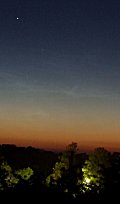
|
Martin
Mc Kenna,
Maghera, Co.Derry, N.Ireland
Jun. 7, 2007 |
#1,
#2, #3,
|
The
northern sky is under attack - A beautiful display of Noctilucent
Cloud is currently visible as I write these words. Wonderful
silvery-blue twisting bands and waves begging for attention
below Capella!
Photo
details: Fuji
S5600, 5.1 MP, ISO200, 13 sec exp. |
|
|
|